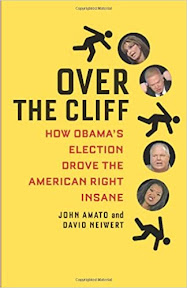
by Arianna Huffington
According to most commentators, the president's press conference went a long way towards taking the spotlight off the roiling anger over AIG, bonuses, and Wall Street abuses -- and putting it back where the president wants it: on the imperative need to pass his budget.
But the best laid plans of our remarkable president may be laid to waste by a bank rescue plan that is the product of exhausted ideas put together by men far too beholden to Wall Street.
Even if the president desperately wants the spotlight to move on from the bank rescue, we should not allow it to. So today let me turn the high beam on one of the main architects of the plan -- less in the news than Tim Geithner, but no less important -- Larry Summers.
To understand why a man as brilliant and accomplished as Summers can be so wrong about what to do with the banks and Wall Street, it would be useful to turn to The Innovator's Dilemma by Harvard Business School professor Clayton Christensen. The book explains how even very successful companies, with very capable personnel, often fail because they tend to stick to the strategies that made them successful in the first place, leaving themselves vulnerable to changing conditions and new realities. So you can have brilliant managers who miss what's needed for success in the future because they are too tied to the past.
This describes Summers to a T.
He is one of the top economic minds of his generation, a tenured professor at Harvard by the time he was 28, with plenty of real word experience -- ranging from heading the Treasury to heading a major university. But his core beliefs and assumptions helped lay the groundwork for the current crisis.
As Treasury Secretary under Clinton, Summers played an important role in convincing Congress in 1999 to pass the Gramm-Leach-Bliley Act, which repealed key portions of the Glass-Steagall Act and allowed commercial banks to get into the mortgage-backed securities and collateralized debt obligations game. The measure also created an oversight disaster, with supervision of banking conglomerates split among a host of different government agencies -- agencies that often failed to let each other know what they were doing and what they were uncovering.
At the signing of the bill, Summers hailed it as "a major step forward to the 21st Century."
Summers also backed Phil Gramm's other financial time bomb, the Commodity Futures Modernization Act, which allowed financial derivatives to be traded without any oversight or regulation. So it was on his watch that the credit-default swaps warhead that has blown up our economy was launched.
[clip]
Many Wall Street high-flyers could echo this -- if they had any self-awareness. Instead, they subscribe to our culture's veneration of exhaustion. Taibbi describes how Wall Streeters, when challenged, "talk about how hard they work, the 90-hour weeks, the stress, the failed marriages, the hemorrhoids and gallstones they all get before they hit 40."
The country would be better off if Wall Street execs and, more importantly, Summers and Geithner -- who, we are admiringly told, works 15 hours a day -- knocked off early and came back to work the next day refreshed... and with some fresh ideas. Rest of article here.
Also, if they are too big to fail - they are too big -Robert Reich Tells us Why Here:














No comments:
Post a Comment